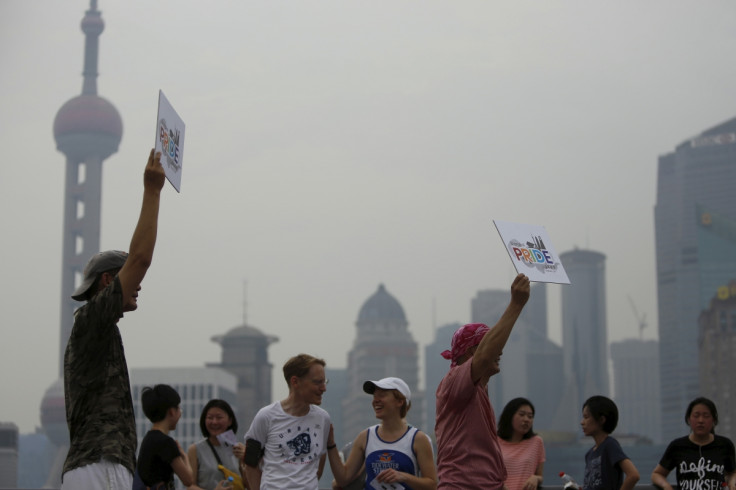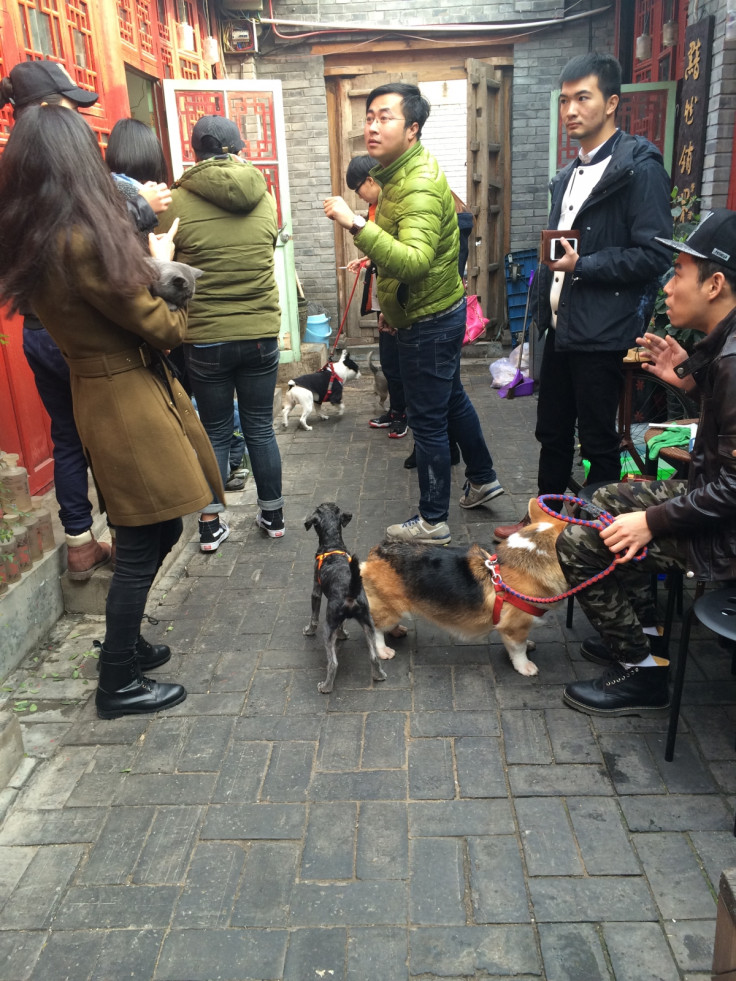China LGBT: Convenience marriage app iHomo helps gay men wed lesbians to appease parents and employers

About three years ago, Ou Xiaobai began to meet more and more gay men who were seeking girls to take home to meet their families during the traditional Chinese Spring Festival. Coming home with a girl on their arm was the only way to stop the endless questions about marriage and match-making attempts by over-zealous relatives.
"Spring Festival is very important for our parents," she said. "They want you to take your girlfriend back home to meet their relatives [and] their colleagues. If you come back alone, you have a lot of pressure. Your parents and your relatives will ask you every day. The most terrible thing is that they'll try to introduce straight girls to you."
Ou, 32, has now launched an app that helps Chinese homosexuals who need fake partnerships to find one other. Called iHomo, Ou and her girlfriend, Yi Zhi, started working on their app last November together with a team of part-time developers. A beta version is scheduled for release next month.
My first requirement is a woman who doesn't allow her parents to boss her around. I have no pressure from my parents to have a child, but I have pressure at work
The phenomenon of cooperative marriages, known as xinghun, has been growing in China over the past decade. Often gay men and women in China's major cities enter such arrangements in order to appease conservative parents or secure better job prospects (many Chinese companies still incentivise marriage).
Chinagayles.com, China's largest xinghun dating site, has 390,000 registered users and says it has matched some 23,000 couples since its launch, in 2005. The site offers a model prenuptial agreement for cooperative marriages, allowing couples to enshrine their arrangement in law.
For gay men, of which there are an estimated 20 million in China, the problem is compounded by conservative attitudes towards homosexuality particularly outside the country's major cities. The face significant pressure from their parents, who expect their son – and because of China's historic one child policy, it is often their only son – to continue the bloodline.
A matchmaking app called Queers attracted 10,000 users in the first two weeks after its launch, in January, its founders told South China Morning Post. Its members are required to submit documents to verify their identity, including pictures of their ID cards, college degrees and property ownership certificates.
Ou estimates more than 100,000 gay men and lesbians in China are currently looking for opposite-sex marriage partners and hopes iHomo can help to play a role. She is looking beyond the app to networking and matchmaking events, which bring gay men and women together in a social setting. She hopes that as well as much-needed marriages of convenience, iHomo can help homosexuals in China build business and friendship networks in their home cities.
Meeting prospective partners
In a downstairs bar near Beijing's Hou Hai Lake, IBTimes UK attended a recent event organised by iHomo where around 100 people filled black plush couches and huddled around tables while sipping orange juice and beer. This was an opportunity for gay men and women to meet partners for cooperative marriages.
As the club started to fill up, people moved from table to table and mingled. A clean-shaved young man took a seat on a couch near a lesbian couple. He said he was a university professor. "My first requirement is a woman who doesn't allow her parents to boss her around," he told the couple. "I have no pressure from my parents to have a child, but I have pressure at work."
Those who seek a cooperative marriage spell out their rules in advance. They discuss whether they would live together; whether they would have a child, and if so, who would raise it; whether they need marriage certificates; whether and how they would get a divorce and how often they would visit their parents.

Wei Xiaogang, executive director of Beijing Gender Health Education Institute and founder of the non-profit Queer Comrades, said the gay men and women who negotiate cooperative marriages are deconstructing the institution of marriage. "It's inspirational to think about it," he said. "It's using a creative way to deal with society's pressure."
Cultural challenges
In 2001, China removed homosexuality from a state list of mental disorders, after decriminalising it in 1997. But society still has a long way to go to accepting the lesbian, gay, bisexual and transgender (LGBT) community. According to a 2013 Pew study, only 21% of Chinese believe society should accept homosexuality.
Han Chenxi, an entrepreneur in Beijing, lived out those statistics a few years ago when she tested her parents' opinion about gay people. She had just started dating a girl and during a visit to her hometown of Chengdu, she asked her parents what they thought about a famous female singer who was rumoured to be dating another woman.
Her mother said "that's freaky" and wondered how the two women could do that. But Han's father, who had travelled to the US, said that happens in other countries as well. Then Han started bringing girls home.
"When I had my first girlfriend, my family thought I was just being curious," Han said. "My father probably thought I would think about settling down and getting married."
But after Han turned 30, her father confronted her. That spurred her to get married to a gay man with similar needs. They had a lavish wedding with fireworks and gun salutes in his hometown in Inner Mongolia, and then several other weddings in Chengdu. But Han couldn't stand seeing her father get so excited about the wedding.
"I told him to stop fantasising about the wedding and investing too much energy in it," she said. "I told him he would be disappointed. He asked me straightforward if I would stay with a girl forever. And I told him, why not. I started telling him about the gay community in China, and told him he should at least learn something about the community."
Parents, Families and Friends of Lesbians and Gays (PFLAG) China is one of several organisations that are offering assistance to parents of gays who have come out. A volunteer, who wanted to be identified by the pseudonym Honghu Mama, said the main problem is that many older Chinese have never heard of or learned anything about homosexuality.
'Being gay is not freaky'
A few decades ago, there were virtually no media reports about the LGBT community. When Honghu Mama found out one of her family members was gay, she looked up information online. Now she volunteers three times a week at the organisation, where she mostly answers phone calls. She advises children to be patient and tells parents that being gay is not freaky and many people live this way.
As gay men and women help one another deal with parental and society pressure, they're also building a tighter community, people who are involved with xinghun say.
Ou's app will offer a "Shop" option, which will list restaurants, pet shops, flower shops and other businesses owned by LGBT people. A "Help" option will connect members looking for jobs, housing or someone to look after their pet with others willing to help. There will also be a group chat feature and one for making friends. In the meantime, she organises regular thematic offline events. At the most recent event, in mid-November, several dozen people brought their pets along for a lunch in a traditional Chinese hutong courtyard.
Ou sees the LGBT community as becoming more self-sufficient. She envisions creating an iHomo café, a housing complex, and eventually a retirement home for LGBT community members – and some trusted straight friends.
Three years ago, she married a gay man. He works in Nanjing and they see each other about every three months. But they've become good friends. In a few decades, she and her husband could retire together, she said, along with their partners, in a different version of happily ever after.
© Copyright IBTimes 2025. All rights reserved.






















